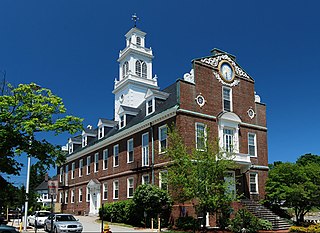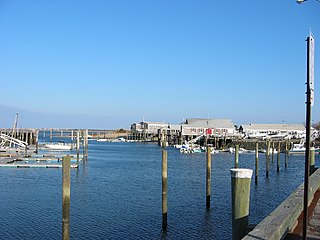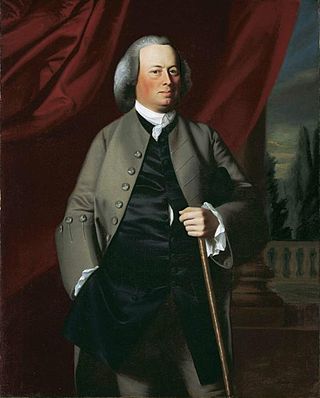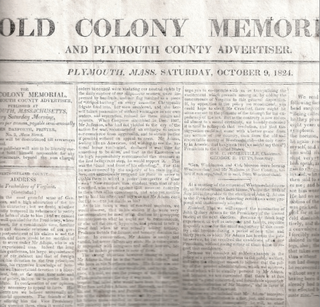
The Old Colony Club is one of the oldest gentlemen's clubs in the United States, founded in 1769 in Plymouth, Massachusetts. [1]

The Old Colony Club is one of the oldest gentlemen's clubs in the United States, founded in 1769 in Plymouth, Massachusetts. [1]
The club was founded in January 1769, by Isaac Lothrop, Pelham Winslow, Thomas Lothrop, Thomas Mayhew, Elkanah Cushman, John Thomas, Edward Winslow, Jr. and John Watson. [2] Their intent in creating a private club was to avoid "the many disadvantages and inconveniences that arise from intermixing with the company at the taverns in ... Plymouth." It went moribund during the American Revolution due to a split between Tory and Patriot members, but was revived in 1875. Its clubhouse on Court Street was purchased in 1893.
The club meets on Fridays at a much-renovated old colonial house on Court Street in downtown Plymouth. The club is best known for its annual celebration of Forefathers' Day, one of the oldest holidays in America, dating from colonial times. [3]
Hoyle's Official Book of Games notwithstanding, the "extinct" game of Bestia is still played every Friday night at this institution.
The Old Colony Club boasts among its early members Revolutionary War hero General Alexander Scammell. [4]

Plymouth County is a county in the U.S. state of Massachusetts, south of Boston. As of the 2020 census, the population was 530,819. Its county seats are Plymouth and Brockton. In 1685, the county was created by the Plymouth General Court, the legislature of Plymouth Colony, predating its annexation by the Massachusetts Bay Colony.

The United Colonies of New England, commonly known as the New England Confederation, was a confederal alliance of the New England colonies of Massachusetts Bay, Plymouth, Saybrook (Connecticut), and New Haven formed in May 1643. Its primary purpose was to unite the Puritan colonies in support of the church, and for defense against the Native Americans and the Dutch colony of New Netherland. It was the first milestone on the long road to colonial unity and was established as a direct result of a war that started between the Mohegan and Narragansett Native American tribes. Its charter provided for the return of fugitive criminals and indentured servants, and served as a forum for resolving inter-colonial disputes. In practice, none of the goals were accomplished.

Quincy is a city in Norfolk County, Massachusetts, United States. It is the largest city in the county and a part of Greater Boston, being Boston's immediate southern suburbs. Its population in 2020 was 101,636, making it the seventh-largest city in the state. Known as the "City of Presidents", Quincy is the birthplace of two U.S. presidents—John Adams and his son John Quincy Adams—as well as John Hancock, the first signer of the Declaration of Independence and the first and third governor of Massachusetts.

Plymouth Colony was the first permanent English colony in New England from 1620 and the third permanent English colony in America, after Newfoundland and the Jamestown Colony. It was settled by the passengers on the Mayflower at a location that had previously been surveyed and named by Captain John Smith. The settlement served as the capital of the colony and developed as the town of Plymouth, Massachusetts. At its height, Plymouth Colony occupied most of what is now the southeastern portion of Massachusetts. Many of the people and events surrounding Plymouth Colony have become part of American folklore, including the American tradition of Thanksgiving and the monument of Plymouth Rock.

Weymouth is a city in Norfolk County, Massachusetts, United States. It is one of 13 municipalities in the state to have city forms of government while retaining "town of" in their official names. It is named after Weymouth, Dorset, a coastal town in England, and is the second-oldest settlement in Massachusetts, second only to Plymouth. It is one of the South Shore's more affordable towns and offers a short commute into Boston, MBTA bus and rail service, and a town beach.

Duxbury is a historic seaside town in Plymouth County, Massachusetts, United States. A suburb located on the South Shore approximately 35 miles (56 km) to the southeast of Boston, the population was 16,090 at the 2020 census.

Barnstable is the name of one of the seven villages within the Town of Barnstable, Massachusetts, United States. The Village of Barnstable is located on the north side of the town, centered along "Old King's Highway", and houses the County Complex of Barnstable County, a small business district, a working harbor, and several small beaches. The village is home to many small attractions, including Sturgis Library, the Olde Colonial Courthouse, the Barnstable Comedy Club, and the Trayser Museum.

The Old South Meeting House is a historic Congregational church building located at the corner of Milk and Washington Streets in the Downtown Crossing area of Boston, Massachusetts, built in 1729. It gained fame as the organizing point for the Boston Tea Party on December 16, 1773. Five thousand or more colonists gathered at the Meeting House, the largest building in Boston at the time.

Wollaston, Massachusetts, is a neighborhood in the city of Quincy, Massachusetts. Divided by Hancock Street or Route 3A, the Wollaston Beach side is known as Wollaston Park, while the Wollaston Hill side is known as Wollaston Heights.

Major-General James Warren was an American merchant, politician and military officer who served as the speaker of the Massachusetts House of Representatives from 1787 to 1788. An advocate of colonial resistance to British parliamentary acts in the American Revolution, Warren served as the Continental Army's Paymaster-General during the Revolutionary War before pursuing a political career.

Quincy Center station is an intermodal transit station in Quincy, Massachusetts. It is a transfer station between the MBTA Red Line subway, MBTA Commuter Rail's Old Colony Lines and Greenbush Line, and a number of MBTA bus routes. It is located between Hancock Street and Burgin Parkway in the Quincy Center district. Opened in 1971, the station was covered by a large parking garage which was closed in 2012 due to structural problems and removed several years later. The station is accessible on all modes.
Thomas Hinckley was the last governor of the Plymouth Colony. Born in England, he arrived in New England as a teenager, and was a leading settler of what is now Barnstable, Massachusetts. He served in a variety of political and military offices before becoming governor of the colony in 1680, a post he held until the colony was folded into the Province of Massachusetts Bay in 1692. A monument, created in 1829 at the Lothrop Hill cemetery in Barnstable, attests to his "piety, usefulness and agency in the public transactions of his time."
North Quincy is a neighborhood of Quincy, Massachusetts. It is separated from the city of Boston by the Neponset River, and borders the Quincy neighborhoods of Squantum, Montclair and Wollaston. It contains the smaller neighborhoods of Atlantic and Norfolk Downs, as well as much of Wollaston Beach.

The Pilgrim Hall Museum at 75 Court Street in Plymouth, Massachusetts is the oldest public museum in the United States in continuous operation, having opened in 1824.

The Mayflower House Museum is an 18th-century period historic house museum in Plymouth, Massachusetts operated by The Mayflower Society, also known as the General Society of Mayflower Descendants. The Society purchased the Edward Winslow House in 1941.

The Old Colony Memorial (est.1822) is a semiweekly newspaper published in Plymouth, Massachusetts. Gannett owns the paper; previous owners include the George W. Prescott Publishing Co. and the Memorial Press Group.
English colonist William Vassall (1592–1656) is remembered both for promoting religious freedom in New England and commencing his family's ownership of slave plantations in the Caribbean. A patentee of the Massachusetts Bay Company, Vassall was among the merchants who petitioned Puritan courts for greater civil liberties and religious tolerance. In 1647, he and John Child published New-England’s Jonas cast up in London, a tract describing the efforts of colonial petitioners. By early 1648, Vassall moved to Barbados to establish a slave-labor sugar plantation. He and his descendants were among the Caribbean's leading planters, holding more than 3,865 people as slaves before Britain abolished slavery in 1833.
Isaac Winslow was an American politician and military officer who lived in Marshfield, Massachusetts. A member of the prominent Winslow family of the Plymouth Colony, he served as a civil and military official in a period marked by political transition.